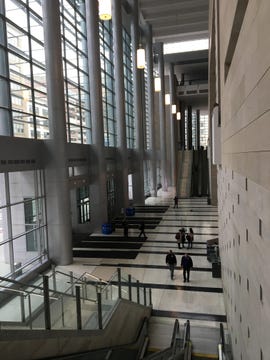As C-suite executives demand that their companies be “digitally transformed,” CIOs and IT managers are diving under the table. After all digital transformation, translated, means “make IT responsible for running the business.”

Photo: Joe McKendrick
With all eyes and pressure on to produce new ways to excite customers, streamline production, and deliver real-time insights to decision-makers, what’s a technology manager to do? First, understand that it means more than a technology fix. “The mainstream availability of a specific set of technology innovations and practices has enabled organizations to transform their business through enhanced automation and data intelligence to achieve greater business value and growth, write Thomas Erl and Roger Stoffers in their latest work, A Field Guide to Digital Transformation.
In particular, there are seven key technology areas that need to be looked at in any digital transformation initiative, the authors state. Erl, who is CEO of Arcitura Education, is one of the business technology’s most prolific authors, well-known for his works on service design principles and patterns. Stoffers is enterprise architect for de Volksbank.
The key technology drivers that should part of a digital transformation include the following:
Enhanced and diverse data collection. “By having a wide range of data as input, digital transformation platforms can offer human decision-makers deeply insightful data intelligence to help improve their decision-making capabilities and further help them discover how new product and service innovations can be introduced,” according to Erl and Stoffers. The availability of widely diverse data sources also helps decision-makers “perform highly sophisticated and intelligent forms of automation that can improve both the quality and efficiency of how business is automated.” Relevant technologies include big data and analytics, internet of things, and robotic process automation (RPA).
Contemporary data science. “Contemporary data science advances are what have propelled digital transformation automation into many organizations, as their automation solutions can now be driven by constant streams of intelligent data that provide genuine value.” Relevant technologies include big data and analytics, artificial intelligence, and machine learning.
Sophisticated automation technology. “Bots can be configured to carry out a range of hands-on processing tasks, such as data entry and information routing.” The technology that enables this is RPA.
Autonomous decision-making. “This enables the solution to rapidly respond to a range of situations that may have previously required more time for correct human decisions to be carried out.” The technology that enables this is AI.
Centralized, scalable, resilient IT resources. “Cloud-based environments can provide the necessary infrastructure to support digital transformation performance requirements.” The technology that enables this is cloud computing.
Immutable data storage. “Highly secure storage technology that emerged from the use of cryptocurrencies has made it possible to position immutable repositories alongside corporate databases.” The technology that enables this is blockchain.
Ubiquitous multi-experience access. This means opening up access to “a range of business interaction options for channels that the customer can choose from. The state of the customer’s activity is always preserved across the different access method types.” The technology that enables this is cloud computing.
Stay connected with us on social media platform for instant update click here to join our Twitter, & Facebook
We are now on Telegram. Click here to join our channel (@TechiUpdate) and stay updated with the latest Technology headlines.
For all the latest Technology News Click Here
For the latest news and updates, follow us on Google News.
